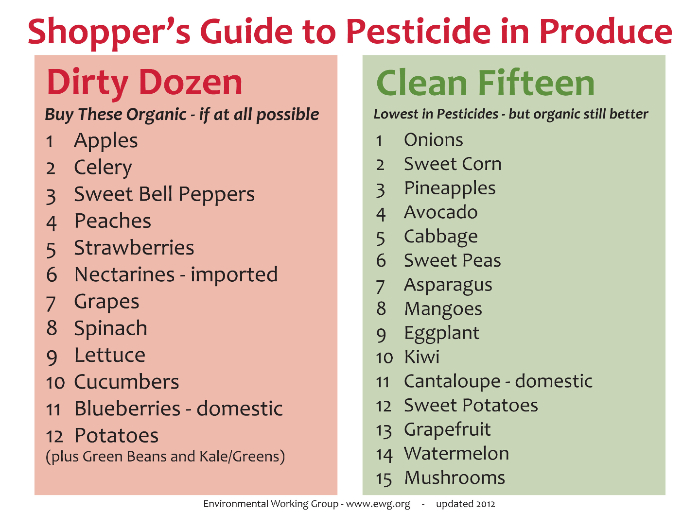
I love a good sale and don’t like buying anything if it is not on sale. Like many people, I used to buy sale produce at the grocery store and create my weekly meals from what I bought. Then, I started learning about the harmful pesticides food producers use when growing the food that is sold in our grocery stores. During the summer, I visit the Farmers Market first for local fruits and vegetables, but they too might use pesticides to keep pests from harming the crops (just ask next time). I wanted to buy organic, but realized that unfortunately due to the economics of farming in the US, organic is more expensive. What is a concerned Mom and family cook to do?
Then I learned about the Clean Fifteen and the Dirty Dozen, and my dilemma was solved. Now I buy only organic fruits and vegetables that are on the Dirty Dozen list. I don’t have to worry about choosing organic fruits and vegetables that are on the Clean Fifteen list, because they are grown without pesticides.
I hope you use this list and find it easier to shop smart and organic where it counts. Here is the 2013 list. The list above is a picture of a 2011 list, as the is updated annually.
Dirty Dozen Plus TM
- Apples
- Celery
- Cherry Tomatoes
- Cucumbers
- Grapes
- Hot Peppers
- Imported nectarines
- Peaches
- Potatoes
- Spinach
- Strawberries
- Sweet bell peppers
- Kale/Collard Greens
- Summer squash
Clean Fifteen TM
- Asparagus
- Avocados
- Cabbage
- Cantaloupe
- Sweet corn
- Eggplant
- Grapefruit
- Kiwi
- Mangos
- Mushrooms
- Onion
- Papaya
- Pineapples
- Sweet peas (frozen)
- Sweet potatoes
You can also get a pdf of this list to put on your refrigerator, and a mobile phone app from the Environmental Working Group website at ewg.org. The app is a great reference when shopping.
